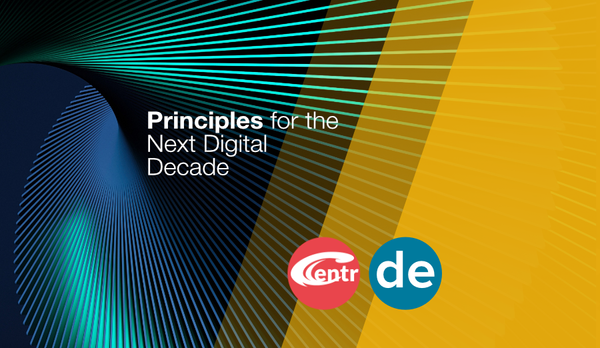The year ahead will be a big year in EU digital policy, as 2024 will see EU policymakers set legislative priorities for the coming 5 years. The EU’s ambitious goals are demonstrated by long-term initiatives such as Web 4.0 and virtual worlds, the Declaration for the Future of the Internet, the Digital Decade Policy Program 2030, and the Declaration on Digital Rights and Principles.
Thus sufficient cause for CENTR, the umbrella organization of European country code top-level domain (ccTLD) registries, to keep its finger on the pulse of digital policy projects at EU level and regularly examine the potential impact they could have on the technical community and its work from the perspective of its association members.
Unfortunately, the past has shown all too often that the expertise of the DNS community, of all players, was hardly taken into account in the relevant EU legislation. Yet it is precisely these technical infrastructure actors that are particularly important – after all, it is them who, by making the Internet work, perform essential services for the digital society.
As a result, in EU digital policy, there is a pressing need for awareness of the technical standards and protocols which form the backbone of the Internet and are therefore key to its continued reliable operation. With this advocacy mission in mind, CENTR recently proposed principles to safeguard Europe’s digital future in the upcoming decade.
Calling on EU Policymakers
to Strengthen the Overall Global Digital Ecosystem
CENTR’s principles draw upon years of experience of its association members including the .DE registry DENIC. They operate and maintain the technical Domain Name System (DNS) infrastructure for the Internet namespaces of their respective countries, applying the well-established network protocol that is used by any service running on the Internet.
In its statement, CENTR appeals to legislators in Brussels to take six core aspects into account in all digital policy considerations and decisions in the coming decade, which reflect key premises from the DNS community’s point of view:
· INTEROPERABILITY
The Internet’s success and scalability has only been possible due to open standards that are publicly available and are developed via transparent processes open to broad participation. Therefore, it is about time for EU policymakers to formally recognise open standards developed in the international Internet standard setting processes, and, where possible, promote their uptake via public procurement to support a free Next Generation Internet which is open for citizens and businesses alike.
· COMPETITION
EU policymakers should remain technologically neutral in legislation affecting the Internet infrastructure, while creating a level playing field by insisting on the use of open standards. Diverse, decentralised systems ensure that there is no single point of failure – actors compete for solutions and thereby strengthen the network's overall resilience.
· ACCESS & CYBERSECURITY
Europe needs a regulatory environment that allows for competitive, reliable, and secure access to online identifiers such as domain names for both European citizens and businesses. When creating new legislation, EU policymakers should therefore always strive to remove existing obstacles while preventing new impediments that would hamper easy access to European digital identifiers, including domain names.
At the same time, legislators in Brussels should actively support EU-wide collaboration in the area of cybersecurity, based on sharing existing good practices established across the technical community, referring to Internet infrastructure operators. There is no cyber resilience without pooling the know-how of all parties involved and fostering private-public endeavours where possible.
· HUMAN RIGHTS
When new legislation is discussed and considered, EU policymakers should make human rights impact assessments public without exception, to ensure transparency in the face of public scrutiny. The free and open Internet fosters the protection of human rights. Policy initiatives that impact human rights online need to be seen through a multistakeholder lens, involving Internet infrastructure operators, to assess technical feasibility.
Additionally, EU policymakers must uphold and adhere to high data protection standards. EU citizens’ security and ability to control their personal data should be prioritised over commercial players’ interests in a data-driven economy.
· ONLINE CONTENT
European legislators must respect the principles of due process and proportionality in any future legislation that deals with removal or blocking of online content. Interventions addressing content removal with the involvement of domain name actors must respect due process, transparency and involve a competent public authority, to safeguard human rights. European legislators should therefore abstain from legislative interventions without a comprehensive and publicly available evidential basis.
European Internet infrastructure has proven to be reliable and secure. Legislation that directly or indirectly refers to intervention at Internet infrastructure level as a solution to a range of societal problems must be backed by public impact assessments and fact-based research.
· GOVERNANCE
There is no future of the open and free Internet without all stakeholders' continued support for the Internet's multistakeholder model. In other words, the governance model as it is practised within the Internet’s global coordination organization ICANN, but also in the Internet Governance Forum (IGF) of the United Nations and its regional and national offshoots such as the Internet Governance Forum Germany.
Therefore, the EU must clearly demonstrate its lasting commitment to the evolving multistakeholder model by actively participating in and insisting on its relevance for the Next Generation Internet. Duplicating Internet governance efforts via national/regional legislation or through other multilateral fora risks creating technical fragmentation and weakening the universality of the Internet.
In Short
It is up to the next generation of EU politicians to take a holistic view of all the layers of the Internet, thus helping to strengthen the overall global digital ecosystem. Without this, the future of the Internet is uncertain.
Together with the entire CENTR community, DENIC expressly endorses these principles and will continue to closely monitor and follow up on policy development processes and the regulatory environment at EU level in the future.
Would you like to even deeper dive into the topic? Then read the detailed policy statement that CENTR has published on its website.














